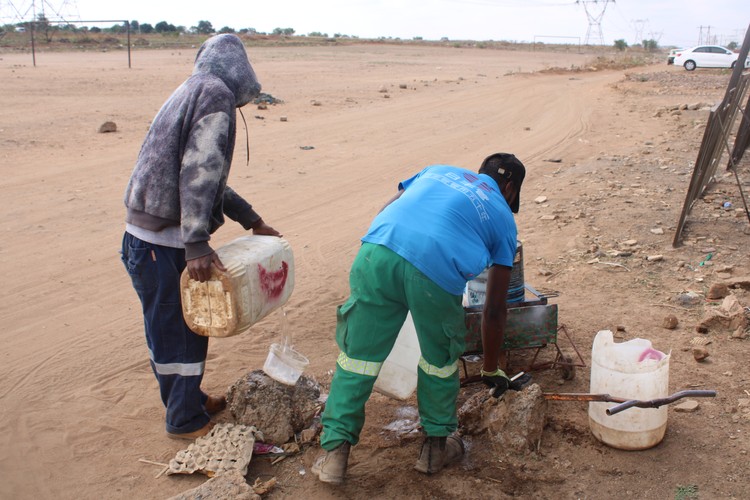
20 November 2024
Mateo Nhlabati and Mogakeleng Makaleng have started charging residents to clean dirty communal toilets in their informal settlement in Tswelopele in Tembisa. Photos: Kimberly Mutandiro
From 8am Mateo Nhlabati and Mogakeleng Makaleng start making their rounds in Tswelopele informal settlement in Tembisa looking for dirty chemical toilets to clean. They put on a pair of gloves, scoop the contents out into buckets, and empty the buckets in the bushes.
When the toilets are cleaned to their satisfaction, they collect a small “thank you fee” from residents—anything between R20 and R100.
The two friends say the strong smell of the dirty toilets bothered them at first, but they are slowly getting used to it.
“We use the money to buy snacks or anything that we want. Jobs are difficult to come by these days,” says Makaleng.
The pair are part of a group of unemployed young people who have been cleaning toilets regularly in the area since the contractor to the City stopped cleaning them over a month ago.
According to community representative Abram Hlongoane, a payment dispute between the City of Ekurhuleni and toilet contractor Sanitech escalated, and the company stopped cleaning the toilets.
He says the City had an agreement for the company to supply and service 850 toilets for the community of about 3,000 households. He says the toilets were cleaned regularly until about a month ago.
Hlongoane says the settlement was formed in 2007. At first the community was supplied with 50 communal flushing toilets, but most of those are no longer functional. He says they were informed that the City owed Sanitech millions.
Residents told GroundUp that they can’t use the filthy toilets, some of which have maggots in them. While some are able to hire young men to clean the toilets in their area, others cannot afford it.
Resident Florah Tjabadi says the community has been neglected by the municipality. Toilets are not the only problem; there is no water or electricity.
One of the dirty toilets that have not been cleaned in three weeks.
Thembi Goodness Mkhize, who is disabled, has a shared toilet in her yard but says she cannot afford to pay young people to clean it. She has to use a bucket inside and sends one of her children to empty the contents in the bush. She says in the past the toilets were cleaned at least every two weeks.
Peter Shingwenyana said he had moved to the area in 2007 and had been hoping to have a house by now. In his section, over 200 households share only four toilets, all of which are now full. His family no longer uses the toilets. He says using a bucket and emptying the contents into the bushes is safer.
According to City spokesperson Zweli Dlamini, the City has a contract with Red Ants and Sanitech (the two companies work together) for the provision of chemical toilets. The agreement currently in place is for the servicing of toilets once a week, said Dlamini.
He said about 3,586 toilets in Tembisa are serviced by Red Ants and 228 by another cleaning company. He acknowledged that the toilets have not been cleaned for the past month but says the City is “working closely with the contractors to ensure that services are back to normal”.
Sanitech’s Managing Director, Robert Erasmus, explained that the company is paid through the Red Ants to clean toilets in parts of the city. He said the company stopped providing services in several areas when the City failed to make payment yet again. Erasmus said they’ve had issues with not receiving payment for several months.
“Red Ants has been in constant contact with the municipality and the mayor to resolve the payment crisis. We have communicated on numerous occasions that we are not able to carry the cost of labour, materials, vehicle costs (including fuel) without payment,” Erasmus said.
He said the company has requested a written payment plan from the municipality so that services can resume immediately.